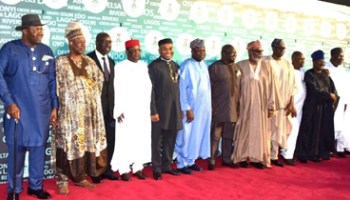The 17 Southern governors Sunday advocated for fundamental structural reforms to uphold the country’s federalism.
The governors asserted that the country’s future would be endangered without devolution of powers to the states, vowing to sustain their resolve through regular meetings.
At the closed door session, the governors deliberated on the agenda, following the opening address by Governor Ambode, Governors Emmanuel, Aregbesola, Nyesom Wike and Okezie Ikpeazu bemoaned what was described as “the country’s distorted federalism which has limited the progress of the country.”
The governors who also lauded Governor Ambode for the initiative for the meeting endorsed him as the chairman of the forum with Governors Dave Umahi of Ebonyi and Seriake Dickson of Bayelsa as co-chairmen.
Governor Ambode who read the communiqué said the governors after extensive deliberations, also emphasized priority on security and lives and property of citizens of the regions, while also resolving to work on effective linkage on good infrastructure across the 17 States in the region.
The Forum also scheduled the next meeting for Port Harcourt in a yet-to-be-announced date.
The only absentee was Governor Rochas Okorocha of Imo State. Thirteen governors were present while three states, Delta, Cross River and Anambra were represented by their deputies.
Aside host, Governor Akinwunmi Ambode, the meeting was attended by Governors of Akwa Ibom, Udom Emmanuel; Ogun, Senator Ibikunle Amosun; Oyo, Senator Abiola Ajimobi; Osun, Ogbeni Rauf Aregbesola; Ebonyi, David Umahi; Edo, Mr. Godwin Obaseki; Ondo, Arakunrin Oluwarotimi Akeredolu; Rivers, Nyesom Wike; Abia, Dr. Okezie Ikpeazu; Enugu, Mr. Ifeanyi Ugwuanyi; Bayelsa, Mr. Seriake Dickson and Ekiti State, Mr. Ayodele Fayose.
Governors of Cross River, Anambra and Delta were represented by their Deputies – Mr. Evara Esu; Dr. Ikem Okeke and Mr. Kingsley Otuaru respectively.
In another development, Ambode frowned at what he described as the non-periodic review of the revenue formula as provided by the constitution to reflect evolving realities.
While welcoming his colleagues to the meeting, he said “States are disparaged for always carrying begging bowls to Abuja in quest of hand-outs from the Federal Government. This is a function of our present national constitution that burdens the Federal Government with activities and responsibilities that rightly fall within the province of states.
“The productivity and revenue-generating capacities of most states are thus stifled, thus turning them into no-better-than-street beggar states incapable of even meeting routine obligations of paying workers’ salaries and pensions without federal support.”
Ambode recalled that Lagos State had fought and won several legal battles since 1999 that have systematically strengthened her autonomy and enhanced her fiscal viability.
He noted that the state had won the legal control over the management of its environment, the control of urban and physical planning, the regulation of overhead masts, the registration and regulation of hotels and restaurants, and the control of inland waterways.
Ambode said these victories belonged, not only to Lagos, but also to other states, adding that, if Lagos could achieve so much by fighting alone, the Southern Governors’ Forum would accomplish more through collective planning and strategy.
The governor said the forum has been reactivated at the time the National Assembly is harmonising its differences over the 1999 Constitution amendment, which will soon be transmitted to the Houses of Assembly for approval
He reflected on the clamour for true federalism and devolution of powers, saying that states will benefit from the envisaged restructuring.
Ambode said the goals of true federalism, which included the strengthening of autonomy and the enhancement of fiscal viability will enable the states to develop at their own pace and based on their peculiarities.
The governor explained the forum had achieved an increased awareness on the sustenance of the national question germane to peaceful co-existence in the country.
However, he said there is a lot to be done and achieved, stressing that true federalism required urgent, meticulous and proactive attention by the forum.
According to him, “the review is crucial to enhance the viability of states and local government and their capacity to fulfil their developmental roles in the polity.
It is important for this forum to comprehensively look at the proposed amendments with a view to working with our respective Houses of Assembly to ensure a coordinated response on our part that will strengthen the practice of democracy, federalism, constitutionalism and the rule of law.”
Ambode clarified that, while pushing for greater devolution of powers, responsibilities and resources from the centre to the states, the goal of the forum is neither to a weak centre and strong states and vice versa.
He said while the initiative was received with mixed feelings at the time, Tinubu was vindicated later because of its achievements as the forum became a vocal voice on maters of critical importance, not only to the Southern Nigeria, but to the country as a whole.
Ambode hailed the forum for advocating for a special allocation to oil-producing states in the Federation Account, adding that its agitation led to the current 13 per cent revenue derivation and allocation from the Federation Account.
He said: “Another major victory won towards strengthening the country’s practice of true federalism was the declaration by the Supreme Court in 2002 that the then prevalent practice of the Federal Government deducting monies from the Federation Account as a first charge for the funding of Joint Venture Contracts, the NNPC priority projects, servicing of Federal Government’s external debt, the judiciary and the Federal Capital Territory (FCT) and other federal obligations were illegal and unconstitutional.
“The Supreme Court in that case abolished the special funds created by the Federal Government to enable it draw funds from the Federation Account to pay for matters that fell within its exclusive responsibility before sharing whatever was left with states and local governments.”

